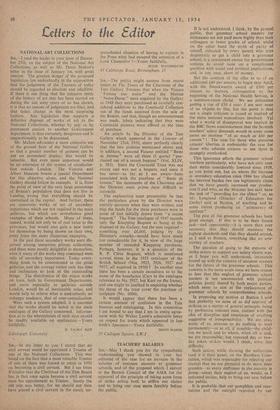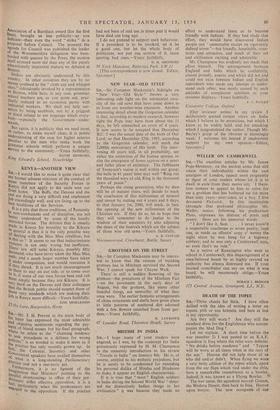TEACHERS' SALARIES
S1R,—May I thank you for the sympathetic understanding you showed in your last editorial of the case for an increase in the salaries of assistant masters at grammar schools, and of the proposal which I moved at the Buxton Council of the AMA for the approval of the principle of taking some form of strike action both to stiffen our claims and to bring our case more forcibly before the public. It is not understood, I think, by the general public, that grammar school masters (or mistresses) are not paid more highly than their colleagues in lower grades of school, whilst on the other hand the myth of pArity of esteent ridiculed by every parent who tries desperately to get a child into a grammar school, is a convenient excuse for governments anxious to avoid issue on a complicated question with social and political implications, and, in any case, short of money.
But the contrast of the offer to us of an additional £40 per annum, to begin next April, with the Danckwaerts award of £500 per annum to doctors, retrospective to the beginning of the National Health Service, is a common-room cliche. We see policemen getting a rise of £50 a year: I am sure none of us objects to this, but the point is that not a single criticism is raised or implied of the extra national expenditure involved. Yet what a world of disapproval was implicit in the BBC News announcement that the Scottish teachers' salary demands would in some cases mean an increase " of as much as £60 per annum " ! The case for those who preserve citizens' liberties is undeniable: the case for those who educate citizens to use them is strangely overlooked.
This ignorance affects the grammar school teachers particularly, who have not only seen their status considerably lowered since 1939, as you point out, but on whom the increase in secondary education since 1944 has placed the heaviest burden (we can legitimately claim that we have greatly increased our produc- tion and who, as the Minister has said, have the task of " providing for the ablest " or, as Mr. Longland (Director of Education for Derby) said at Buxton, of teaching and to some extent producing an " aristocracy of intellect."
The past of the grammar schools has been great enough. If this is to be their future task—and opportunity--it is more than ever necessary that they should maintain the highest standards and that they should attract, as I said at Buxton, something like an aris- tocracy of teachers.
The question of going to the extreme of strike action to support our salary claims was, as I hope you will understand, intimately hound up with the concern of assistant masters for the future of the grammar schools. This concern is the more acute since we have reason to fear that this neglect of grammar school masters is not unconnected with political policies, partly shared by both major parties, which seem to aim at the replacement of grammar schools by comprehensive schools.
In proposing my motion at Buxton I said that probably we none of us did approve of striking as a matter of general principle, being by profession rational men, instinct with the idea of discipline and suspicious of anything suggestive of irresponsibility. We are also, many of us, anxious to do nothing to hurt permanently—or at all, if possible—the child- ren we teach and to whom, when all is said, we are responsible; but repeated day or two- day token strikes would, I think, solve this difficulty.
Such action. while showing the authorities (and it is their panel, on the Burnham Com- mittee, which was responsible for rejecting our claims) that we are prepared to do more than grumble--as every staff room in the country is doing—about their neglect of us, would, as I indicated earlier, help to bring our case before the public.
It is probable that our pamphlets and reso- lutions and the outright rejection by our
Association of a Burnham award (for the first lime), brought us less publicity—as you indicate—than even the word " strike " in a proposal before Council. The moment the agenda for Council was published the leader of the Worcestershire delegation was bom- barded with queries by the Press; the motion itself aroused more stir than any of the purely educationally important matters we debated at Buxton.
Strikes are obviously understood by this
country. In other countries they are by no Means confined to the " cloth cap and whippet class," ridiculously invoked by a representative at Buxton, while here, in any case, grammar school teachers are, as you point out, prac- tically reduced to an economic parity with industrial workers. We shall not help our- selves by being snobbish, nor by a priggish or timid refusal to use language which every- body—especially the Government—under- stands.
But again, it is publicity that we need most,
or rather, to make myself clear, it is public Understanding of the case for higher salaries Peculiar to the men who make work the grammar schools which perform a unique service to the community.—Yours faithfully,
DAVID HENSCHEL



































 Previous page
Previous page